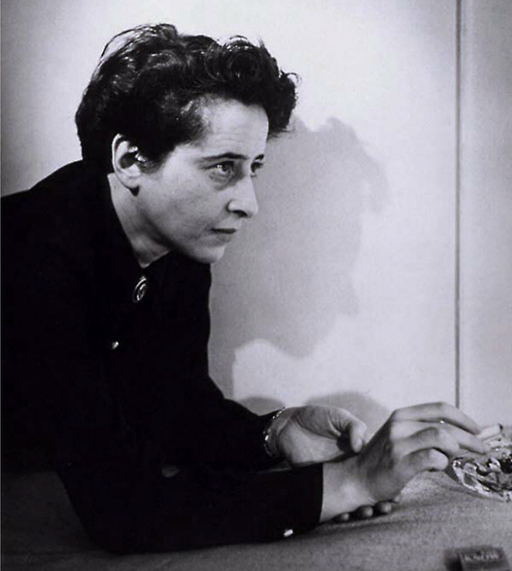4 Thinking outsourced?
If (…) the ability to tell right from wrong should turn out to have anything to do with the ability to think, then we must be able to ‘demand’ its exercise from every sane person, no matter how erudite or ignorant, intelligent or stupid, he may happen to be.
Now return to the beginning and revisit our initial questions:
- Does AI eliminate the need for thinking tools?
- Can or should we outsource our thinking and decision making to machines?
The quote above gives you some hint about our view. The American philosopher Hannah Arendt (1906–1975) wrote this backed up by the direct experience of a totalitarian state (Nazi Germany) in which many people did adopt a mindset that avoided thinking and taking responsibility. In this case, thinking was outsourced to the ‘Führer’ (English translation: leader) and his state, rather than machines. Yet, arguably, the same principle is at stake.
Our view on the matter is that thinking can’t be outsourced. Although machines can help people improve their thinking, in the end they should make the decisions and carry the responsibility for them. Without a doubt, our view will have influenced the selection of materials and arguments for this session. But that should not stop you from finding additional sources and evidence before determining your own stance!
Some people have argued that the eventual supremacy of AI over humanity is inevitable. They include Ray Kurzweil (born 1948), an inventor and director of research at Google. His book The Age of Spiritual Machines quotes the following, at first sight, quite persuasive argument.
As society and the problems that face it become more and more complex and as machines become more and more intelligent, people will let machines make more and more of their decisions for them, simply because machine-made decisions will bring better results than man-made ones. Eventually a stage may be reached at which the decisions necessary to keep the system running will be so complex that human beings will be incapable of making them intelligently. At that stage the machines will be in effective control. People won’t be able to just turn the machine off, because they will be so dependent on them that turning them off would amount to suicide. … and because human work will no longer be necessary the masses will be superfluous, a useless burden on the system.
Bill Joy, a computer engineer and co-founder of Sun Systems (once a leading computer hardware and software company), points out that:
In [Kurzweil’s] book, you don't discover until you turn the page that the author of this passage is Theodore Kaczynski – the Unabomber. … Kaczynski's actions were murderous and, in my view, criminally insane. He is clearly a Luddite, but simply saying this does not dismiss his argument; as difficult as it is for me to acknowledge, I saw some merit in the reasoning in this single passage’

